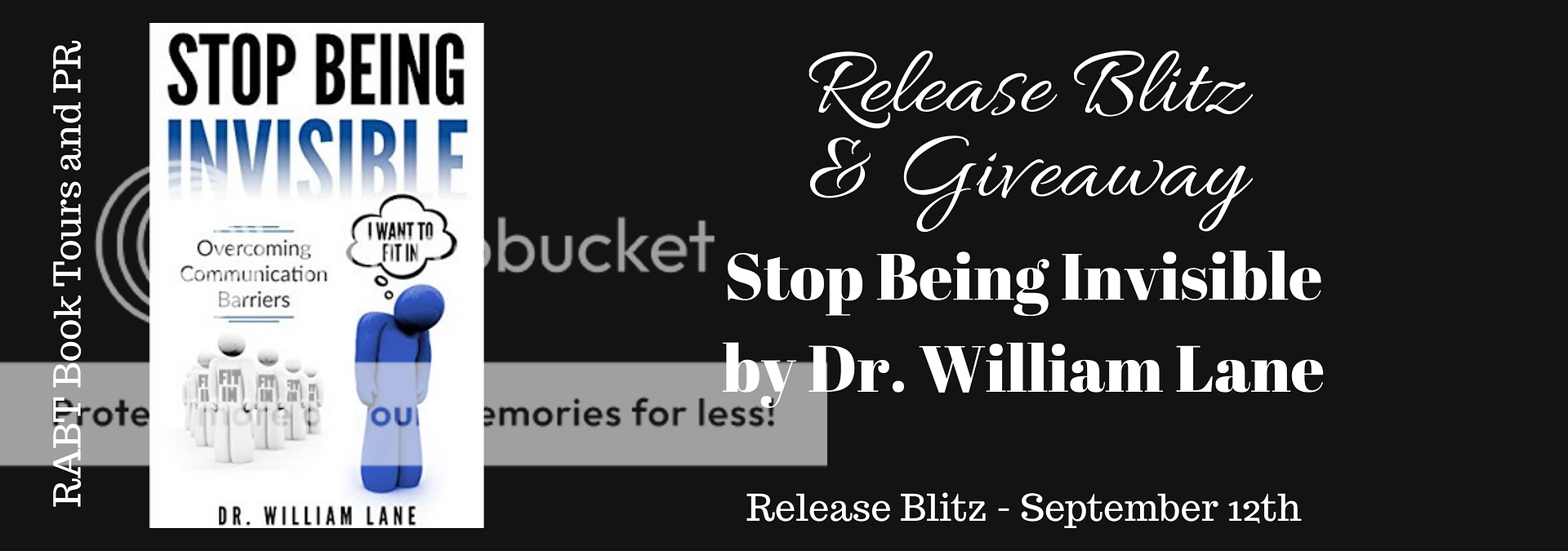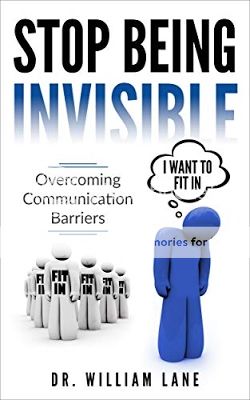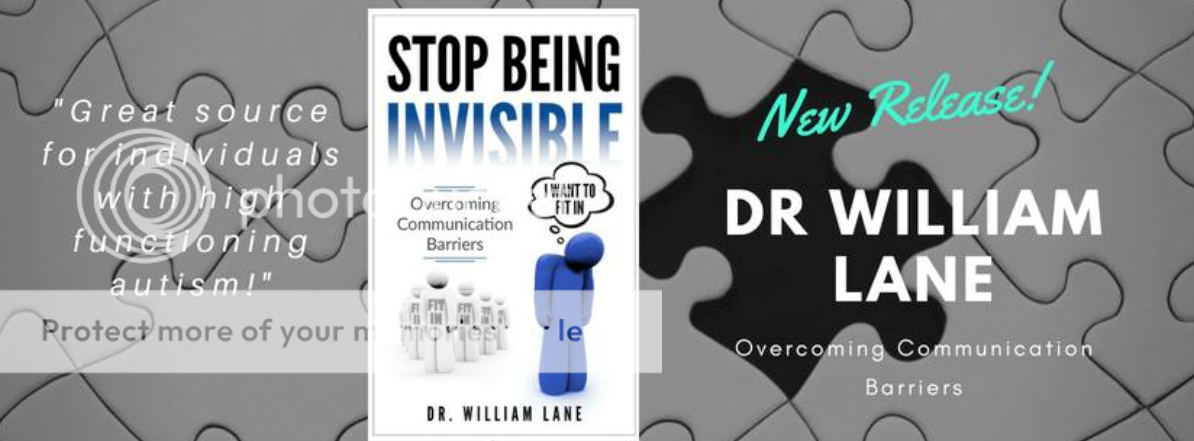 He has spent over 35 years providing educational services, first working in public education as an elementary, middle and high school teacher and school administrator; and then later as a university professor and department chair of special education programs.
He has spent over 35 years providing educational services, first working in public education as an elementary, middle and high school teacher and school administrator; and then later as a university professor and department chair of special education programs.
Published: September 12th, 2018
Stop Being Invisible - Overcoming Communication Barriers comes to us from Dr. William Lane, global educational consultant. He has spent over 35 years providing educational services, first working in public education as an elementary, middle and high school teacher and school administrator; and then later as a university professor and department chair of special education programs. He has dedicated his life’s work to educating students and improving their opportunities for success in life. Having experienced firsthand the pain of missed opportunities that were a direct result of his limited ability to communicate effectively from childhood until well into adulthood, his passion about this subject shines through as he very effectively communicates in this book how to improve not only the quality of your communications with others, but also your resulting experiences in life.
His “WHY” to answering his calling to not only work on changing his own communication challenges, but to focus his work on improving the struggles of others, occurred one day when during a conversation, it was brought to his attention that people often jokingly referred to him as a “weatherman.” Thinking it odd, he questioned what was meant by that name. He was told that people avoided talking to him because usually, the only time he contributed to a conversation was when he asked about how the weather was. He realized that he was choosing to participate in conversations by becoming a “non-participant.” Whether in the role of boyfriend, husband, dad, brother, uncle, cousin, friend, coach or any of the many other roles in life he had assumed, few people had been able to understand his non-communicative style.
The response was not kind, but it did become a major wake-up call. This powerful and descriptive one-sided revelation of how others felt about having him as part of their conversations made him realize that it was time for drastic changes. He is no longer called “the weatherman,” and has gone on to guide many others with communication barriers to adopt effective communication skills resulting in the deeper connections that come from great conversations.
EXCERPT
Chapter 1: WHAT IS COMMUNICATION?
“Communication—the human connection—is the key to personal and career success.”
—Paul J. Meyer
Communication is the transferring of information from the speaker (message sender) to the listener (message receiver). The word “communication” is derived from the Latin word “communis,” meaning to share. (A special thank you, Mrs. Levitt! Students who were fortunate enough to have Mrs. Levitt as an English teacher, know exactly what I mean.) Communication is a two-way process that involves at least one sender in a manner that allows for message delivery that is clear and successful, and by at least one listener who receives and understands.
Of the two parts of the communication process (sending and receiving), the sending of the message was never the difficult part for me because I rarely cared to send any messages. Instead, I expected others to send the message to which I would choose to respond or ignore. A vast majority, in fact, ALL of the messages that were sent, I chose to ignore.
The receiving and understanding of the message being sent was the difficult part of the process for me. Whether I was choosing not to want to receive the message (“Why do I care about what you are saying/What is its significance to me?”, or sarcastically thinking “That is REALLY nice”…or being able to understand the message being sent (“What are you talking about?”) all were contributing factors to mine and others opinions that I possessed a “failure to communicate”.
This failure to respond appropriately was probably rooted in my low self-esteem (as previously referenced). My thought process was, why would anybody be interested in anything I would have to say? Or, thinking that the answers provided by others would be better than mine so why should I bother them with my response? It’s just a thought on my part as to a reason you may have chosen to ignore communications.
As I reflect back on this past problem, it seems like the reason for the failure of this successful transferring of information occurred because one or more of the participants was not stating the purpose of their communication to me. In other words, “why was this communication occurring”?
For me, had the speaker explained the purpose of the communication, or at least alluded to its purpose, this may have provided me a reason to listen. In the same way, a memo includes a subject or RE: line that identifies the topic or intention of the memo. Had the message sender started the conversation with statements similar to those stated in the example below, they would have been providing me with a purpose of tuning into or participating in the conversation.
For me, the use of these “attention-getting statements,” introducing the topic, if you will, would have brought new meaning, an alert so to speak, for my needing to more carefully focus my attention to the message being sent. Instead, my feeling of having no rationale to care about a conversation supported my thoughts that I could just opt out of any and all communications.
On many occasions, I was too distracted by the myriad of other activities going on to focus on what one particular person was saying. These distractions included the conversation of other people nearby, the music on the radio, etc. When I finally did realize that I was being included in a conversation that was occurring and that I should be tuned into, I had no clue what was being discussed and, therefore, had no interest and could not see how the conversation required my participation. Entering into the middle of conversations about which I had no idea of the topic was something I chose not to do.
Making “attention-getting statements” to gain their students’ attention is a common practice for many educators. Here are just a few samples of the many that can be used: “One, two, three, eyes on me” “Hocus Pocus-Everyone Focus,” “Who is ready to rock and roll?”
For me, I found it most beneficial when people would start their conversation with statements similar to these:
“I want to share this (funny, interesting, serious, etc.) story with you”
“What I am going to tell you is important!”
“It is necessary that you understand what we are going to be talking about because….”
“You need to listen carefully to this next…”
“Here is why you need to listen to what I am saying…”
“I want to know what your thoughts are…”
OR, if someone noticed that I was not paying attention to a conversation and made an attempt to draw my attention back to the topic of the conversation and also provide a quick recap of the conversation like; “Bill, our conversation is about Japan and we were wondering if you would share some of your experiences since you were over there for four years.” Statements like these would have made it easier for me to see the rationale for my participation, help me participate in a “partially missed” conversation, or resume an active listening role in the communication process.
About the author:
Throughout Dr. Lane’s thirty-five-year educational career, his passion has always been providing information, practice, and support to individuals with special needs.
He believes that everyone, in their own way, can become a contributing and productive member of society and that effective communication is the most important of all life skills. Improved communication skills improve the quality of life for all, not just individuals with special needs.
Dr. Lane is a proficient, dynamic, and sought after public speaker and speaks to audiences around the world. His focus is educating individuals, families, and educators on the “awesome power” of effective communication skills. He inspires his audiences to practice, discuss, and encourage others to improve their communication skills, while demonstrating practical ways to understand, retain and apply the skills he teaches.
Once these skills are understood, retained (through practice and reflection), and utilized, those who apply the life skills that are taught will feel more confident and better able to CONNECT with others in a variety of circumstances and setting
Author's Giveaway
a Rafflecopter giveaway



No comments:
Post a Comment